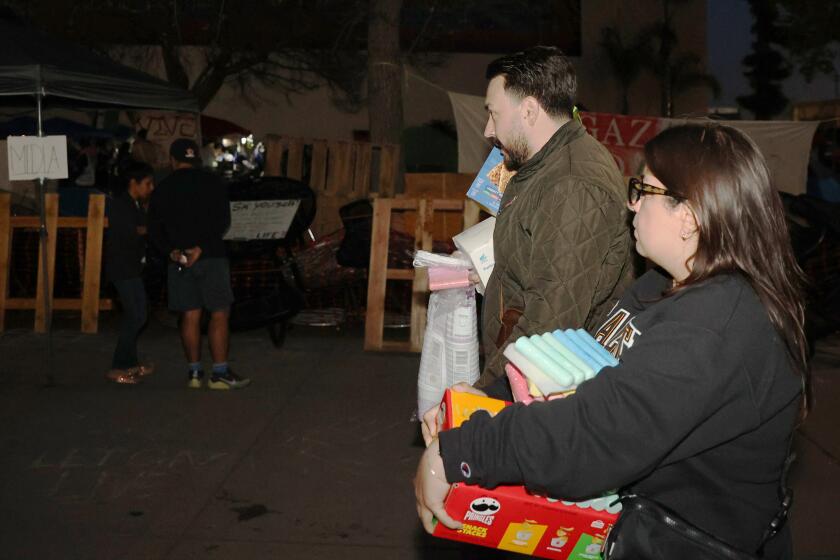Erred in Letting Mass Murder Suspect Slip Away, Police Admit
Police Chief John Kearns acknowledged Wednesday that his officers committed a serious error by allowing the main suspect in a mass murder to disappear just hours after the first of seven bodies were dug up in her back yard.
Although detectives last Saturday did not have enough evidence to arrest Dorothea Montalvo Puente, Kearns said, “she should have been followed. She should have been tailed very closely. She was a prime suspect in a homicide case. There isn’t any excuse as far as I am concerned why the suspect was not kept under surveillance.”
Decision Defended
Kearns, who had been in Southern California attending a conference when one of the most sensational murder stories in Sacramento history began unfolding late last week at a Victorian boarding house, defended his department’s decision not to arrest the boarding house proprietress, saying officers might have jeopardized their case if they had acted in haste.
“You’ve got to realize you’re walking on egg shells when talking to a suspect without an arrest warrant or a search warrant. She could have refused to allow the officers to dig in the yard,” he said.
The department has been criticized by local officials and neighbors for allowing the main suspect to slip away from the scene and walk unescorted to a nearby hotel, ostensibly to visit a nephew. The criticism intensified when affidavits filed in the case revealed that police knew the woman had a prior prison record and a propensity for lying.
The woman, suspected of murdering her boarders for their Social Security checks, was still at large Wednesday as police formally appealed to Mexican officials for help in locating her. Police also said they had contacted officials in Garden Grove, where Puente once lived.
Citing insufficient evidence, police on Wednesday also released Mervin John McCauley, a tenant in the boarding house who had been arrested as an accessory Sunday.
A warning about Puente’s operation of the downtown rooming house was sounded last June when the Sacramento County Adult Protective Services office complained to the state Department of Social Services that she was running an unlicensed board-and-care facility and that she once had been sent to prison for misuse of client funds.
But Puente apparently was able to lie her way out of suspicion, persuading a state licensing inspector that only a cousin lived in the house and that she occasionally offered free temporary shelter to homeless people, according to a state licensing report. The state inspector concluded that the complaint that Puente was providing care and supervision without a license was unfounded.
At the time of the state inspector’s visit June 30, Alberto Montoya, a severly mentally ill man whom Puente since has been accused of murdering, was a tenant and under her care.
Court records obtained Wednesday show that Puente has had a long history of criminal activity, arrests and convictions for a variety of offenses dating back to 1948.
Over time, each of her clashes with the law proved more serious and more violent than the last.
Yet she was able repeatedly to place herself into positions of trust despite her criminal record--working as a nurse’s aide and as a manager of board-and-care homes, with responsibility for the elderly, the mentally disturbed and the physically disabled.
She “was known for her generosity and hospitality to those in need,” stated a Sacramento County probation report prepared for the court in 1982 when she was sentenced to five years in prison for doping a series of victims, stealing their cash and jewelry, and forging signatures on their checks.
The same report reveals a troubled life and a seriously disturbed personality.
A psychiatrist who was treating her at the time of sentencing described her as a “schizophrenic, chronic undifferentiated type” and “a very disturbed woman.”
In recommending that she serve prison time, probation officials asserted that Puente “has demonstrated that she is a danger to elderly persons.”
The 59-year-old Puente was born in California, the youngest of 18 children, she told probation officials who prepared the 1982 report. Both her parents were dead by the time she was 5, she told authorities; she was raised by her grandmother and an aunt in Fresno.
The records indicate that she was married at least four times--the first when she was 17.
By age 19, she was a widow and a convicted felon, found guilty of forging checks in Riverside.
In 1960, she served 90 days in Sacramento County Jail “for residing in a house of ill fame and received 90 days suspended for vagrancy,” the probation report said.
Eighteen years later after at least one other brush with the law, she was convicted in federal court for fraudulently endorsing “approximately 34 checks”--U.S. Treasury payments to residents in a board-and-care facility that Puente operated.
While on federal probation, she was again found guilty of forging checks, this time on state charges. Her victims were for the most part elderly individuals who took Puente into their confidence, only to be drugged and then robbed by her, the court records show.
Prior to her sentencing, Puente “expressed remorse for all the victims that lost some of their possessions,” Sacramento County Deputy Probation Officer Tony Ruiz reported.
“She indicated that she, too, had suffered as a child and disliked seeing other individuals suffer likewise,” Ruiz wrote. “Throughout the interview, the defendant mentioned her relatives’ dependence on her and her disappointment in herself in letting them down.”
However, in a seeming contradiction to her other statements, she repeatedly denied committing the crimes for which she was convicted, explaining that she pleaded guilty because “it was simply part of the plea-bargain arrangements.”
More to Read
Start your day right
Sign up for Essential California for news, features and recommendations from the L.A. Times and beyond in your inbox six days a week.
You may occasionally receive promotional content from the Los Angeles Times.






